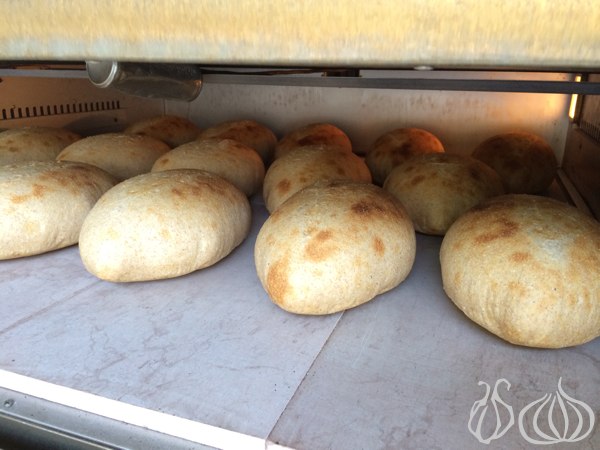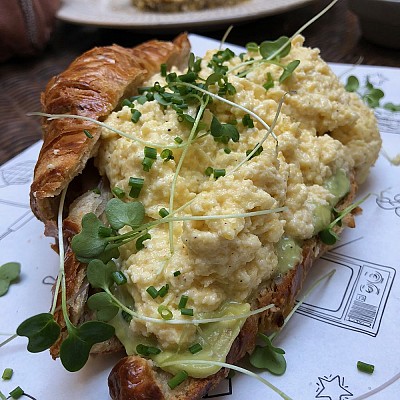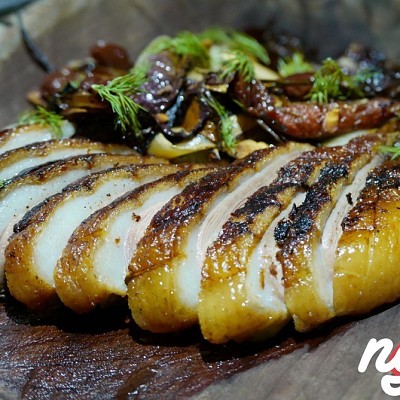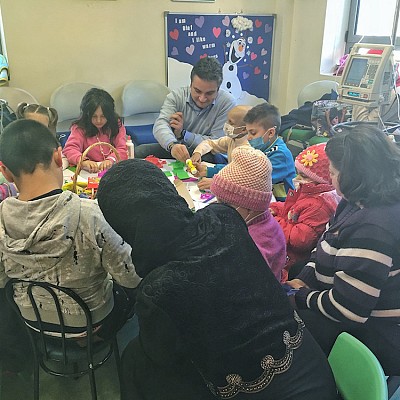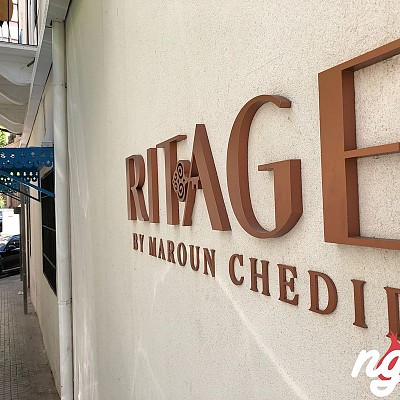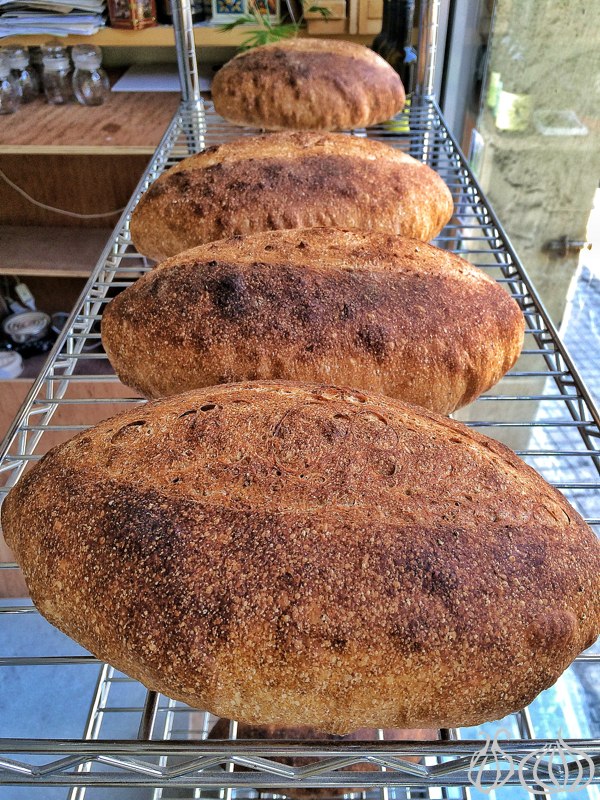Waking up every day at 6am to prepare the dough, mix it, carve and bake it... Roger spends all his day creating fine pieces of bread for the connoisseurs.









Two years ago, Roger Nasr a photographer and cinematographer who worked all his life producing documentaries decided to start a new chapter in his life, a new career. He learned the chemical and scientific details of bread production all by himself making him one of the few, not to say the only artisan baker I know to personally produce bread on his own using ancestral techniques. Down in his small atelier in Achrafieh, I went to meet Roger. It all started a few months ago while having dinner at "Le Bistrot de Michel". The smell, the crunch, the bite... I was falling in love with a piece of bread. I immediately asked where this bread was made and this was how I reached "Roger le Boulanger" or the baker. I went to him not knowing what to expect but was so happy to meet the man behind these innovative creations.

Before opening his bakery, Roger started baking his own bread at home, a practice that soon turned out to be appreciated by friends and family. After some extensive research, this passionate man opened his small place in the center of the capital baking cookies and cakes as well as bread, one single kind of bread called "Pain bis au levain naturel". Humbly, Roger doesn't pretend to be a master in his practice: "I am an autodidact person, still learning, an apprentice without a master." Today, I didn't only meet an interesting man but a brain filled with an extensive knowledge about his work. I have learned about bread, bacteria, acidity and the long process behind every bun weighting 500 grams and sold only for LBP8,000. Only 80 pieces of these jewels are produced on average daily.

What does Roger produce? Roger produces something called Pain bis au levain naturel: using a middle range grading of flour "110" which is the best absorbed by the body -considering that the higher the number is the purest the quality, numbers between 50 and 150. The minerals are best absorbed by the body in this organic flour specially imported from France. Farine « bis » isn’t white, but it isn’t whole wheat. The bran and germ that are in the flour are very fine and color the flour a tint of beige, making a bread that may be called « grey ». A premium flour is key adding to that the professionalism of using sourdough.
Roger uses Levain Naturel, what's also called ingenious yeast, a mix he personally prepared, and feeds every night adding to it some flour and water. This magical potion, the bakers secret has a big part in the success of a bakery so keeping it alive is key. Every couple weeks, the sourdough's power fades out and it's time to start the process again. "15 long days, yes, the sourdough needs 15 days to mature, so keeping up the business running is carefully studied". Producing bread is understanding two major things. First of all, prepare your sourdough, the natural yeast that's the key of the process and know the role it has in creating enzymes and producing an acidity inside the bread that will create aromas before trapping them back inside. The second thing is to master the equilibrium of the bread's saltiness, caramelization and stability... Honestly, I never knew that bread production was that complicated!

Roger continued to tell me about his bread while he prepared the dough. It was 1pm in this hot day, alone in his laboratory he was weighting every loaf individually before molding it in a bowl shape. All follows an exact timing he has been developing for the last two years. He first weight the dough, keeps it for relaxation in its spherical form before carving it into torpedo shapes that are ready to enter the oven. That way, as promised, bread will be ready at 05:30pm.
"People have to understand something," Roger continues. "There is a big difference between a tasty bread and a healthy one. Bread caries lots of nutrients if produced correctly. Mine might not be the tastiest but believe me it's one of the healthiest."
I was amazed... Describing his little babies, Roger uses the art of hypnosis, photography and cooking. He talks about sub-conscience, then explains about depth of field before jumping into ingredient mixing and chemistry. I was standing near him amazed.

Now for the process:
- First the preferment "Pré-ferment" is prepared the night before. Levain or sourdough, that's called the "rafraishit". The long fermentation process has just started
- The first step of a working day is mixing the dough
- Stretch and fold comes next
- Now the dough is left aside to ferment. Fermentation starts in an anaerobe environment "pointage". The bulk fermentation needs up to 4 hours
- Cutting the dough. This delicate process is all done by hand. The baker feels the dough, it's thickness and air bubbles forming inside shaping it, deflating it and molding it with love.
- Left aside, now is bench proofing for 20 minutes (pre-shaping)
- "Apprêt" (shaping and final proofing)
- Cooking for 30minutes; starting at 260 degrees down to 200 degrees
- Take out the dough and lay it down in cooking racks for a long hour minimum
"Let me tell you a secret Anthony. The method is even more important than the ingredients. I only use salt, water and flour and surely many do the same. What makes the difference is the technique and passion out in every bake. Like our grandparents used to say, Al Nafas bel akel."

Good to know:
- Don't expect to enter into a full fledged bakery with bread display: Roger produces daily according to orders received
- Roger uses BioMoulin, an organic flour imported from France
- Roger's bread stays fresh for three days after production
- Roger recommends a book called, "Le Gout du Pain" by Raymond Calvel: You can download it here
- Send your orders to [email protected] or call roger on +961 3 793129
- Bread is sold at the boutique everyday between 05:30pm and 07:30pm or delivered to your door steps in within Beirut for LBP1,000 extra
- Bicycle delivery does exist in Beirut

Now for the bread:
- A simple piece of wonder it is. Freshness is felt in every bite...
- Take the bread in your two hands and start by feeling its lightness. Caress it and enjoy its roughness and purity
- Bring it up to your nose... smell it... feel its rich aromas
- Break it in half and bite into it... as is, no add-ons needed
- The bread has a certain moisture, a certain purity, a certain smell, a unique aroma that' one of kind
- A thick naturally crispy envelop hiding a labyrinth of air bubbles inside
- The core is clearly majestic: A cavity after the other, yeast had long hours to work this labyrinth out
- A pure taste that's unique, eat it as is or simply toast it for couple minutes and spread Labneh on it. A thick labneh from the village, olive oil, sprinkle some thyme... Ouf! I can eat that all year

I will come back my dear Roger, I will come back to make some bread with you and learn about one of the worlds most basic foods...


















